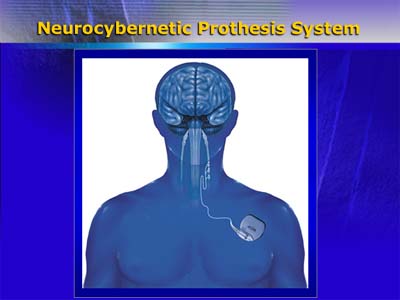Vagus nerve stimulation is a method for treating central nervous system disorders with electrical current. This mode of treatment has been approved in the U.S. and Europe since the mid-1990s for treatment of epilepsy.

A pocket watch sized generator is implanted under the patient's chest. A lead wire from the device is tunneled up the neck and coils at the end of the wire wrapped around the vagus nerve in the neck to deliver mild electrical stimulation to the vagus nerve. Vagus nerve stimulation has been approved to treat epilepsy and is at various levels of investigational clinical study as a potential treatment for severe depression, obesity and Alzheimer's disease.
In a procedure that takes about one hour and does not require an overnight hospital stay, a stopwatch-sized generator is implanted under the skin on the left side of the chest and is connected by an electrode to the left cervical vagus nerve. After healing of the incision, the device is activated and thereafter delivers mild, intermittent electrical pulses to the nerve. Frequency, duration, and intensity of stimulation are adjustable.
Dr. Rush and his colleagues in Europe completed a ten-week clinical trial of vagus nerve stimulation in 60 patients with severe, treatment-resistant depression. Patients were permitted to continue medication during the trial.
One third of the group showed a clinically significant antidepressant response, with half of them achieving remission of depressive symptoms.
The response rate increased and the rate of remission doubled during an ensuing nine months of continuation treatment with vagus nerve stimulation.
None of the patients experienced clinically significant adverse effects from vagus nerve stimulation. One patient requested removal of the generator because of a perceived lack of benefit. The most common adverse effect, reported by 50 percent of patients at ten weeks and by 20 percent at one year, was brief voice change during stimulation. Other adverse effects included mild coughing or throat-clearing during stimulation. A few patients reported shortness of breath during heavy exertion.
Dr. Rush believes that vagus nerve stimulation may prove useful for treatment of some patients with depression, particularly patients whose symptoms have responded insufficiently to pharmacotherapy.